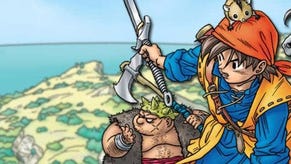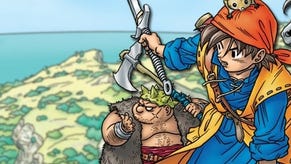Mr Dragon Quest: The Cursed King
Yuji Horii shares his fantasy.
The Japanese video gaming myth has largely been dispelled over the past five years. "Facts" and figures about the way games are consumed in the largest Far Eastern console-hungry market have been laid bare. Pokemon really did appear on the side of a Boeing 747. Hundreds of kids in Tokyo did play link-up Neo Geo Pocket outside PlayStation Festival 2000 in an orderly queue. Shops in Akihabra do still sell Dreamcast games. There is a gaming "basement" in Tecmo's headquarters where Tomonobu Itagaki goes to smoke fags, and there really is a guy on the Dead or Alive team that models breasts. And Enix RPG Dragon Quest is the biggest selling game in Japan, PlayStation 2 or otherwise. No, it really is. In the past 20 years it's sold more than 40 million units in Japan alone, dwarfing the likes of Pokemon and Gran Turismo. Sometimes fact is more awe inspiring that fiction.
Dragon Quest finally made it out of Japan with the release of the seventh title, a PS2 exclusive, which reached American shores. Retail success, and a handy merger between Enix and Final Fantasy owner Square, gave enough impetus to push the eighth game towards a European release, the expenditure of translating a 60-hour marathon into Spanish, Italian, French and German as well as English realistic at last. Yuji Horii - series head and Japanese gaming God - in London to promote the upcoming release of the game in Europe, is having some myths of his own dispelled about gaming life outside the Far East.
"From meeting you guys and other Europeans, I know now that fans of Dragon Quest in the west are huge otaku, that they're big fans, so I want to give them more chance to play the game," he says, surrounded by journalists in London's Soho hotel.
Horii is the producer and creator of the Dragon Quest franchise, a middle-aged man who started out on Japanese comics such as Shonen-Jump, moving into games design in the early 80s. Dragon Quest first released in 1986, with the third game seriously hitting the big time in Japan, catapulting Horii to fame. Worldwide attention has been slow coming, but Horii believes the games can easily transcend cultural boundaries.
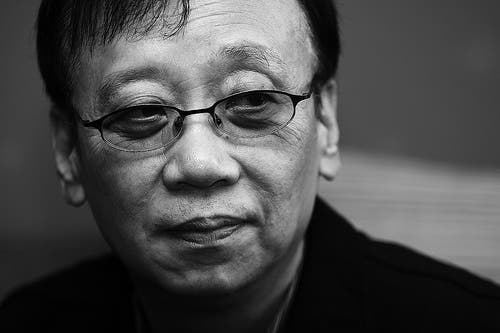
"The world is getting smaller," he says. "The things that people enjoy are becoming more common across countries, so I won't be changing my style in that sense. As a creator, of course, I want as many people to play my baby as possible. I'm happy to see it being released in other areas."
While Horii isn't changing the way he creates games for other territories, he's mindful of the very real need for localisation. The European version of Dragon Quest VIII has been renamed Dragon Quest: The Journey of the Cursed King ("Why can't I get the other seven, mum?"), and some significant cosmetic changes have been made before Horii's latest was allowed out of Japan. The Japanese version didn't have voices: the European - and American game, for that matter - is fully dubbed using English actors "to increase the dramatic feel for the modern player," according to Square-Enix PR. Some character abilities have been altered, new battle effects have been added, and the original music has been replaced in its entirety, synthesiser strains suitable for Japan giving way to a full orchestra. The world may be getting smaller, but we're not sucking the same noodle quite yet, it would seem. Does Horii think he's done enough to create another "cultural phenomenon" - his words to describe the way the game is seen in Japan - in the West?
"I can't say yes or no," he says. "Booms happen by chance. Word of mouth spreads it and people just find it. It's timing. A lot of different elements come into play to make a boom. They say in Japan that the game boom is over, that it's gone, but despite that Dragon Quest VII sold 4.2 million copies, then Dragon Quest VIII went on to sell 3 million in the first three days. So even though there is no boom, and they say the boom is over, people know what they want. If there's a good thing out there, people will buy it. Although there's no boom any more, it's just part of everyday life, everyday culture in Japan now. It's a normal part of culture. We can't plan for it, but we've done our best to make the games acceptable for European users, so who knows? It might just catch on and become the next Harry Potter, we'll just see how it goes."
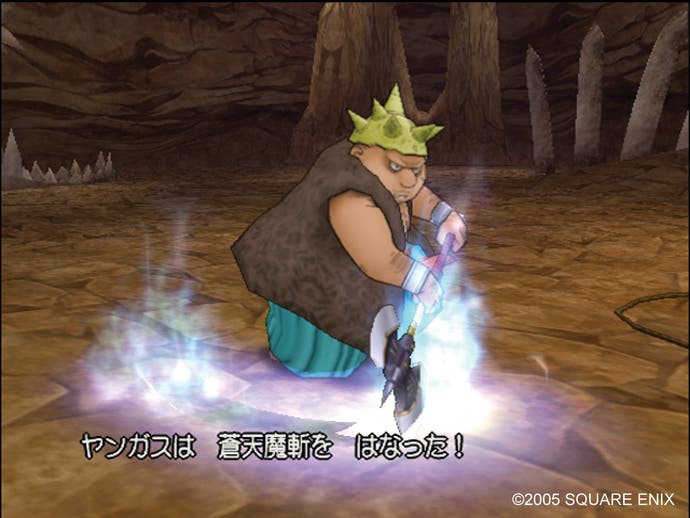
It's taken 20 years to "see how it goes" with Dragon Quest outside Japan, but the gaming world's now saturated with PlayStation 2 hardware and the planets of Square and Enix moving into alignment have allowed Horii to dare to dream of Potter status on a global level.
"I'm very thankful of the merger in that way," he says. "It has enabled the Dragon Quest series to be released in more territories than it would under Enix alone."
Dragon Quest: The Journey of the Cursed King producer Ryutaro Ichimura chips in.
"It wasn't just the merger," he adds. "There are timing aspects as well. The hardware's changed so the graphics have got better, and European tastes have changed because of the influence of anime and cartoons, so Europeans are more willing to receive this type of artwork. I think it's a combination of those things, and the timing's allowed it to be released in Europe this time."
Horii curls up his nose when we ask whether or not he wanted to release Dragon Quest VII in Europe as well as the States.
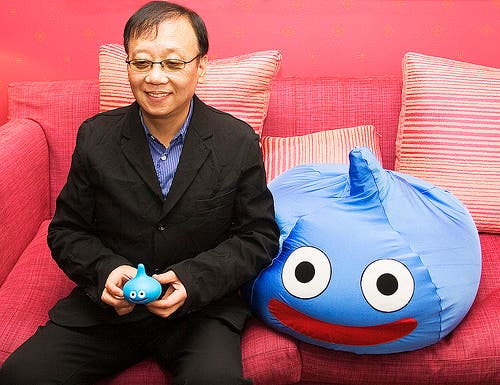
"Of course I wanted to release it," he says. "We didn't have the resources to release it in Europe, with distribution channels and so on, and we also had the problem of releasing so many different languages. Also, if you look at the graphics, they were quite cheap and we had to express story with text - it wasn't so visual, it was more text-based. Finally in VIII, there are so many animations and actions in there that it's become more visual, so you don't have to express things as text. You can show off more as graphics. This has allowed us to release it visually."
The game itself sees you, a "brave young castle guardsman" set out on a huge adventure to save a kingdom from an evil-type person, Dholumagus. The king's been transformed into a troll, and his daughter into a horse. Monarchies don't work so well with the royal family only able to eat hay and sit under bridges looking surly, so you and your band set out to put things right. Think Final Fantasy but without the angst. Horii thinks the simplicity of the concept will appeal to Europeans easily.
"It's a game where you experience the story for yourself, and you are the hero," he says, shrugging. "You can play this game in any way that you feel best suits your own style. You become the hero of this game. I'm the type of guy that doesn't read the manual for computer games, so I made this game so you don't have to read the manual. You can just pick up the game and touch the controller and you automatically know what you're doing. It's a very simple interface. It's very easy to enter the game. So for the first 30 minutes, walking around a town, you're like, 'Wow, I feel as though I live in this town.' It's so intuitive, the way you enter the world."
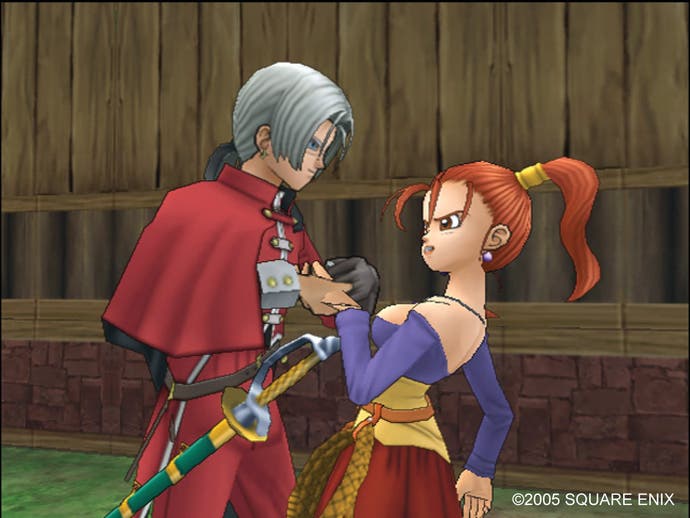
Intuition in gameplay and design in general is what Horii does. He may be a 50 year-old spokesperson for Dragon Quest, but he makes games for a living. He's just as happy talking about console as distribution chains, thankfully, and he's powerful enough the throw two fingers up when it suits him.
"I don't care too much about the progression of hardware," he says, grinning, when asked about the next round of machines from Sony and Microsoft. "It really doesn't matter that much any more. I think it's sad that people are moving away from games because they're becoming more complicated, and it's getting harder to choose between platforms. I wish everyone would settle on one platform and make games for that platform. Controversial, I know."
He laughs bitterly.
"Originally I wanted to be a Manga artist, but when I was making Manga, I first met up with the technology of computer games," he continues when someone asks a question about the Revolution controller. "I loved the fact that it was interactive, that you do something and you get feedback. I thought that an interactive story where you get feedback and rewards from everything that you do would be interesting. I like the idea of interactivity with the hardware, so there, where you mention the Nintendo controller, it's a new interface, and it's exciting to have that reaction. You do something, and it reacts to you. It's human nature that to have some feedback from your actions it rewarding."
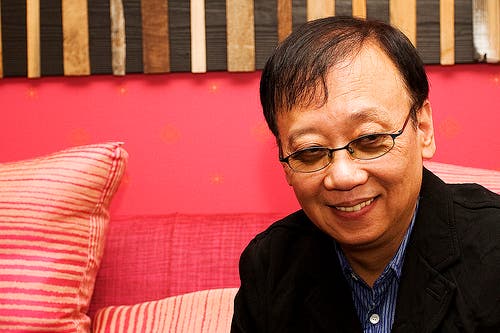
Horii's an interesting guy, and he's obviously enjoying himself. A Japanese kid's asking him questions about the save system in Dragon Quest II, which has Horii and his team in pleats, and he talks briefly about how Akira Toriyama - the character designer on The Journey of the Cursed King and the creator of anime smash Dragon Ball - even managed to a vaguely dirty joke into the eighth game. Lots of laughing. But the PRs are twitching and Horii's a busy man. He has time to ponder the European influence for the setting for the game before we're ushered out.
"I liked fantasy when I was a child," he says, smiling. "I prefer old style fantasy will swords and dungeons to science fiction. People used to say that western style fantasy would never be accepted by Japan. But then Dragon Quest sold so well, and lately Harry Potter's gone on to be very successful in Japan. Enjoyment has become more standard between countries. What people enjoyed is now becoming common throughout the world; unified. Artwork, and so on, breaks down the barriers of language, so that's why things have become more popular throughout different cultures. These days, Japanese people think Lord of the Rings and Harry Potter are great, so now we're taking things from western culture and giving them back to the west. It's coming full circle."
Dragon Quest: The Journey of the Cursed King releases in Europe in April for PlayStation 2.

